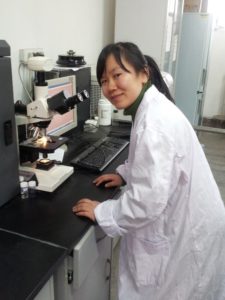Meet the Author
 We are very pleased to introduce Shanshan Li, co-author of the paper ‘Characterization of co-metabolic biodegradation of methyl tert-butyl ether by a Acinetobacter sp. strain‘ with Dan Wang, Dan Du, Keke Qian and Wei Yan. Her article has been very well received and handpicked by our reviewers and handling editors as one of our HOT articles. Shanshan was kind enough to tell us more about the work that went into this article and what he hopes to achieve in the future. You can find out more about Shanshan and her article below and find more HOT articles in our online collection.
We are very pleased to introduce Shanshan Li, co-author of the paper ‘Characterization of co-metabolic biodegradation of methyl tert-butyl ether by a Acinetobacter sp. strain‘ with Dan Wang, Dan Du, Keke Qian and Wei Yan. Her article has been very well received and handpicked by our reviewers and handling editors as one of our HOT articles. Shanshan was kind enough to tell us more about the work that went into this article and what he hopes to achieve in the future. You can find out more about Shanshan and her article below and find more HOT articles in our online collection.
Shanshan Li works at the Department of Environmental Science & Engineering, Xi’an Jiaotong University.
Could you briefly explain the focus of your article to the non-specialist (in one or two sentences only) and why it is of current interest?
The article focused on characterization the co-metabolic of MTBE by a single strain Acinetobacter sp. SL3, which possesses the ability to degrade MTBE when grown on n-alkane (C5-C8) substrates.
With the widespread use of MTBE, its contamination has aroused great public concern, so the development of effective technology to eliminate MTBE contamination is necessary. A newly isolated Acinetobacter sp. SL3, possesses the ability to continuous degrade MTBE co-metabolically, and it is significant to investigate the useful properties of the strain for the bioremediation.
How big an impact could your results potentially have?
The results of this paper revealed the useful properties of Acinetobacter sp. SL3 for the bioremediation of MTBE via co-metabolism and provided a basis for the further development of new MTBE elimination technologies.
Could you explain the motivation behind this study?
We found that the single strain Acinetobacter sp. SL3. can degrade MTBE via co-metabolism efficiently, and the research may be applied to new MTBE elimination technologies.
In your opinion, what are the key design considerations for your study?
The key design consideration is the kinetic characteristic of MTBE co-metabolism associated with the potential pathway for the co-metabolism of MTBE by Acinetobacter sp. SL3 on n-octane.
In your article you mention that the findings can be used for the development of new MTBE elimination technologies. Please could you expand on this?
MTBE is used as an effective gasoline oxygenate because of its favorable properties. It is likely that MTBE contamination occur along with gasoline. The results of this article revealed that the higher MTBE degradation rate is observed with longer n-alkanes by Acinetobacter sp. SL3. The research may contribute to new ideas about eliminating MTBE polluted water or soil that are adjacent to gas stations.
Which part of the work towards this paper proved to be most challenging?
The most challenging section of this paper is to propose the potential pathway for the co-metabolism of MTBE by n-octane-grown cells of Acinetobacter sp. SL3.
What aspect of your work are you most excited about at the moment?
I am most excited about this aspect of this work is propose the potential MTBE degradation pathway by Acinetobacter sp. SL3 grown on n-octane based on a series of experimental proofs.
What is the next step? What work is planned?
On the basis of summing up, our next work is able to concentrate on the elimination of TBA to increase MTBE degradation rate in a fixed system with time, and further verify the proposed pathway for the co-metabolism of MTBE by n-octane-grown cells of Acinetobacter sp. SL3.
Characterization of co-metabolic biodegradation of methyl tert-butyl ether by a Acinetobacter sp. strain
Shanshan Li, Dan Wang, Dan Du, Keke Qian and Wei Yan
RSC Adv., 2019, 9, 38962-38972
DOI: 10.1039/C9RA09507A, Paper

Submit to RSC Advances today! Check out our author guidelines for information on our article types or find out more about the advantages of publishing in a Royal Society of Chemistry journal.
Keep up to date with our latest HOT articles, Reviews, Collections & more by following us on Twitter. You can also keep informed by signing up to our E-Alerts.











